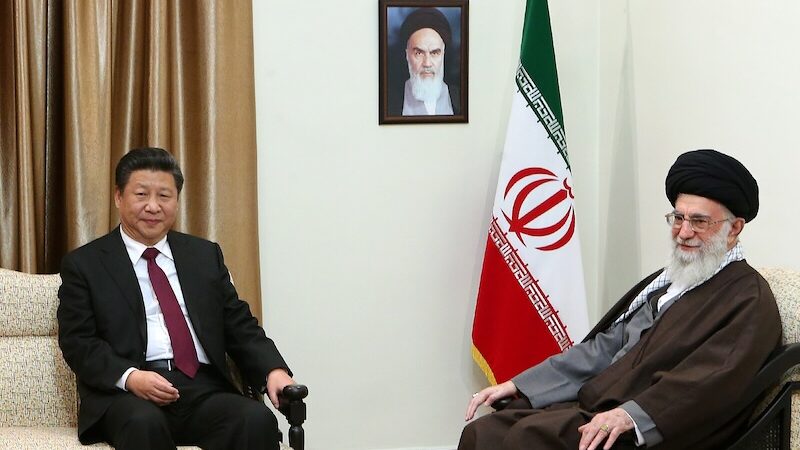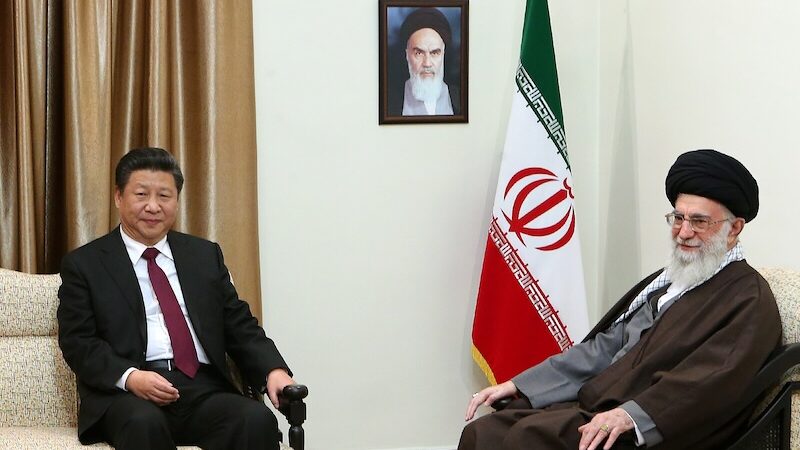The Middle East's Shifting Sands: China's Strategic Harvest From America's Challenges

Welcome to your ultimate source for breaking news, trending updates, and in-depth stories from around the world. Whether it's politics, technology, entertainment, sports, or lifestyle, we bring you real-time updates that keep you informed and ahead of the curve.
Our team works tirelessly to ensure you never miss a moment. From the latest developments in global events to the most talked-about topics on social media, our news platform is designed to deliver accurate and timely information, all in one place.
Stay in the know and join thousands of readers who trust us for reliable, up-to-date content. Explore our expertly curated articles and dive deeper into the stories that matter to you. Visit Best Website now and be part of the conversation. Don't miss out on the headlines that shape our world!
Table of Contents
The Middle East's Shifting Sands: China's Strategic Harvest from America's Challenges
The Middle East, a region historically dominated by great power competition between the US and its allies, and the Soviet Union/Russia, is witnessing a dramatic shift. America's perceived waning influence, coupled with its shifting foreign policy priorities, has created a power vacuum, one that China is expertly exploiting to its strategic advantage. This isn't simply about economic gain; it's a multifaceted strategy encompassing political influence, energy security, and technological dominance.
America's Retreat and the Rise of Chinese Influence
For decades, the US maintained a significant military and political presence in the Middle East, largely driven by concerns over oil supplies, regional stability, and countering Soviet/Russian influence. However, the costly wars in Iraq and Afghanistan, coupled with a growing domestic focus, have led many to perceive a relative decline in American engagement. This perception, whether accurate or not, has created an opportunity for other global players, most notably China.
This isn't a sudden development. China's Belt and Road Initiative (BRI), a massive infrastructure project spanning continents, has significantly invested in the Middle East. Projects ranging from ports in Djibouti and Pakistan to high-speed rail lines in Saudi Arabia, demonstrate China's long-term commitment to the region. This infrastructure investment isn't altruistic; it strengthens China's economic ties, provides access to crucial resources, and enhances its geopolitical influence.
Beyond Infrastructure: A Multi-Pronged Strategy
China's strategy goes beyond mere infrastructure development. Several key areas highlight its growing influence:
-
Energy Security: China's voracious appetite for energy necessitates securing reliable supplies. The Middle East, home to vast oil and gas reserves, is crucial to meeting this demand. Strengthening economic and diplomatic ties with Middle Eastern nations secures access to these vital resources.
-
Technological Advancement: China is actively promoting technological cooperation with Middle Eastern countries, offering advanced technologies in areas like 5G, artificial intelligence, and renewable energy. This not only strengthens economic ties but also allows China to establish technological standards and influence the region's digital landscape. This is a direct challenge to established Western tech giants.
-
Political Influence: China’s approach is often characterized as “non-interference” in the internal affairs of other nations. This contrasts sharply with the US's often interventionist foreign policy and appeals to many Middle Eastern governments wary of Western influence. This perceived neutrality allows China to cultivate strong relationships across a diverse range of political systems.
-
Military Cooperation: While less overt than its economic and technological engagement, China is also quietly expanding its military ties with certain Middle Eastern nations, primarily through arms sales and joint military exercises. This enhances its overall strategic influence in the region.
The Implications for the Future
The shifting sands of the Middle East present a complex and evolving landscape. China's strategic gains are undeniable, but the long-term implications remain uncertain. The US continues to maintain significant interests in the region, and its future actions will significantly shape the balance of power. The competition between these two global giants will continue to define the geopolitical trajectory of the Middle East for years to come. This is a story unfolding in real-time, and its conclusion remains to be written.
What are your thoughts on China's growing influence in the Middle East? Share your perspective in the comments below.

Thank you for visiting our website, your trusted source for the latest updates and in-depth coverage on The Middle East's Shifting Sands: China's Strategic Harvest From America's Challenges. We're committed to keeping you informed with timely and accurate information to meet your curiosity and needs.
If you have any questions, suggestions, or feedback, we'd love to hear from you. Your insights are valuable to us and help us improve to serve you better. Feel free to reach out through our contact page.
Don't forget to bookmark our website and check back regularly for the latest headlines and trending topics. See you next time, and thank you for being part of our growing community!
Featured Posts
-
 Mgk Shares The Special Significance Of Daughter Cases Name
Jun 22, 2025
Mgk Shares The Special Significance Of Daughter Cases Name
Jun 22, 2025 -
 Assisted Dying Bill Your Mps Vote And What It Means
Jun 22, 2025
Assisted Dying Bill Your Mps Vote And What It Means
Jun 22, 2025 -
 Dodgers And Padres Players Suspended After Tense Series Finale
Jun 22, 2025
Dodgers And Padres Players Suspended After Tense Series Finale
Jun 22, 2025 -
 The Shifting Sands Chinas Geopolitical Gains In The Middle East
Jun 22, 2025
The Shifting Sands Chinas Geopolitical Gains In The Middle East
Jun 22, 2025 -
 Between A Rock And A Hard Place Qatars Neutral Stance Challenged By The Iran Israel Crisis
Jun 22, 2025
Between A Rock And A Hard Place Qatars Neutral Stance Challenged By The Iran Israel Crisis
Jun 22, 2025
Latest Posts
-
 Nba Trade Speculation Knicks Eyeing 30 Million Wing And Center In Josh Hart Deal
Jun 23, 2025
Nba Trade Speculation Knicks Eyeing 30 Million Wing And Center In Josh Hart Deal
Jun 23, 2025 -
 Scottie Pippen On Jalen Williams He Can Be Even Better Than Me
Jun 23, 2025
Scottie Pippen On Jalen Williams He Can Be Even Better Than Me
Jun 23, 2025 -
 Bbcs Planned Ban On Palestine Action A Members Response
Jun 23, 2025
Bbcs Planned Ban On Palestine Action A Members Response
Jun 23, 2025 -
 Cnns Fareed Zakaria Weighs In Us Military Action Against Iranian Nuclear Program
Jun 23, 2025
Cnns Fareed Zakaria Weighs In Us Military Action Against Iranian Nuclear Program
Jun 23, 2025 -
 Indiana Pacers Postseason Push Myles Turners Crucial Role
Jun 23, 2025
Indiana Pacers Postseason Push Myles Turners Crucial Role
Jun 23, 2025
